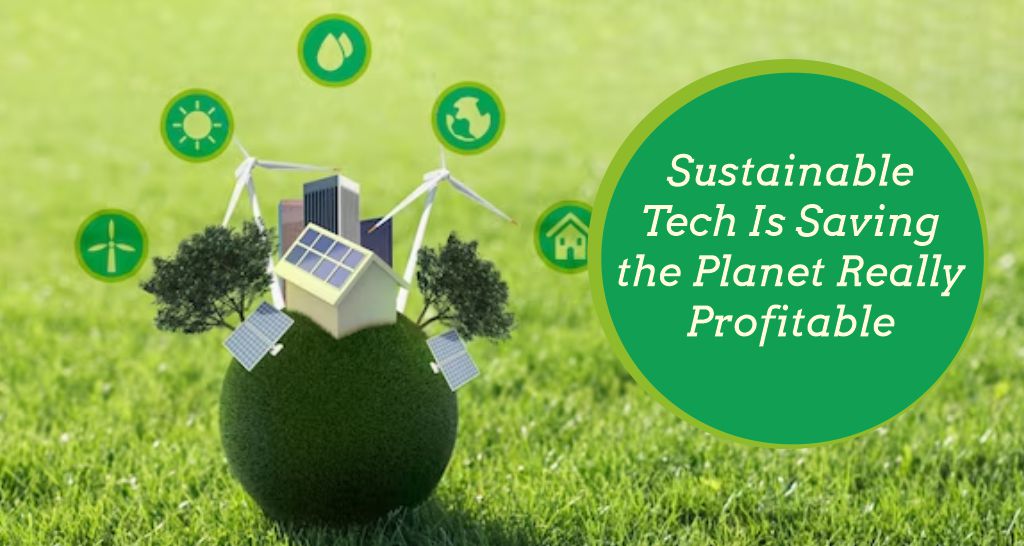Amidst the backdrop of environmental concerns and a heightened understanding of our impact on the planet, the convergence of technology and sustainability has emerged as a hotbed of innovation and discussion. Sustainable technology, also known as “green tech” or “clean tech,” seeks to tackle environmental issues while also taking into account economic feasibility. One pressing question is whether businesses can turn saving the planet into a profitable venture. This essay explores the fascinating realm of sustainable technology, delving into its potential benefits, challenges, and the delicate balance between ecological preservation and economic prosperity.
Embracing the Era of Sustainable Technology
The growing concern to tackle climate change, lower carbon emissions, and mitigate environmental harm has sparked the emergence of sustainable technology. The advancements in renewable energy, energy efficiency, waste management, and sustainable agriculture are revolutionizing various industries and opening up exciting economic prospects. More and more, people are realising the significance of embracing eco-friendly practices, which is leading us towards a future that is greener and more sustainable.
Empowering Consumers to Drive Change
The profitability of sustainable technology is heavily influenced by consumer behavior. In today’s world, more and more people are becoming conscious of environmental issues and are actively looking for products and services that reflect their values. This change in consumer preferences gives rise to a market for businesses that place a high value on sustainability. Businesses that effectively convey their dedication to sustainable practices and provide environmentally friendly products have the potential to gain a competitive advantage in the market.
The Advantages of Sustainable Technology
The positive impact of sustainable technology on the environment is quite evident. Renewable energy sources like solar, wind, and hydropower provide a cleaner and greener option compared to fossil fuels. They help in reducing air and water pollution while also playing a crucial role in combating climate change.
- Resource Efficiency: Sustainable technologies prioritize the effective use of resources, reducing waste and extending the lifespan of products. Recycling and circular economy practices are becoming increasingly popular, helping to alleviate the strain on landfills and preserve precious resources.
- Exciting Possibilities: The move towards sustainable technology has opened up a thriving market for innovative green products and services. Businesses are discovering lucrative opportunities by catering to the growing demand for environmentally friendly products and services. From solar panels and electric vehicles to eco-friendly construction materials, there is a wide range of options available to meet the needs of conscious consumers.
- Embracing Creativity and Fostering Employment: The drive for sustainable solutions has sparked remarkable technological advancements. Thanks to investments in research and development, we’ve made significant strides in energy storage, carbon capture, and alternative materials. This innovation has the potential to bring about job creation and stimulate economic growth.
The Fascinating World of Sustainable Technology
One of the main obstacles to sustainable technology is the significant upfront investment required for implementation. For businesses, especially smaller ones, investing in renewable energy infrastructure or adopting eco-friendly manufacturing processes can seem financially daunting.
- Intermittency and Reliability: Certain renewable energy sources, like solar and wind power, rely on weather conditions and can be unpredictable. The ever-changing nature of energy sources presents a significant hurdle in ensuring a reliable energy supply. This calls for the creation of effective energy storage solutions.
- Resistance to Change: Traditional practices and well-established industries focused on non-renewable resources often exhibit a reluctance to embrace change. Transitioning to sustainable technologies can be a challenge as some stakeholders may need more support to let go of traditional and familiar methods.
- Global Cooperation: Environmental issues have a global scope and necessitate collaboration among nations to tackle them effectively. A lack of a unified global approach can pose challenges to the widespread adoption and effectiveness of sustainable technologies.
The Enigma of Profitability
Although the advantages of sustainable technology are clear, one might wonder if businesses can genuinely benefit from their efforts to save the planet. The answer can vary depending on different factors such as industry, scale, and geographical context.
- Economic Incentives: Governments often encourage businesses to embrace sustainable practices through various economic incentives offered in different regions. These incentives can include tax breaks, subsidies, or regulatory advantages, which make it financially appealing for companies to invest in green technologies.
- Consumer Demand: With the rising awareness of environmental issues, there is a growing desire for sustainable products and services. Aligning with eco-friendly practices can help companies tap into a growing market and foster brand loyalty among environmentally conscious consumers.
- Long-Term Cost Savings: Although the initial investment in sustainable technologies can be significant, businesses often discover that they lead to substantial savings over time. Implementing energy-efficient practices, reducing waste, and optimizing resources can lead to improved operational efficiency and financial advantages in the long run.
- Addressing Risks: More and more businesses are realising the importance of tackling the risks linked to environmental degradation, climate change, and resource depletion. Implementing sustainable practices can help reduce these risks and ensure the business’s long-term success.
Exploring Real-Life Examples
Let’s take a look at some interesting case studies that highlight the profitability of sustainable technology:
- Tesla: The electric car manufacturer Tesla has shown that sustainable technology can be both eco-conscious and financially successful. The remarkable achievements of this endeavor have sparked a worldwide transition towards electric vehicles and sustainable energy solutions.
- IKEA: IKEA has set a goal to achieve carbon neutrality by 2030. Ikea is committed to minimizing its environmental footprint and appealing to consumers who care about the planet. This is achieved through investments in renewable energy, energy-efficient products, and sustainable sourcing.
- Google: Major tech companies, such as Google, have made significant investments in renewable energy sources to power their data centers efficiently. Google’s dedication to utilizing 100% renewable energy has not only decreased its carbon footprint but has also showcased the economic feasibility of sustainable practices in the technology industry.
Conclusion
Sustainable technology plays a crucial role in tackling environmental challenges on a global scale, providing a way to protect our planet while also promoting economic growth. Despite the obstacles, the rising recognition of climate change and the growing need for environmentally friendly solutions indicate that businesses have the potential to benefit from preserving the planet. Collaboration between governments, consumers, and businesses is crucial in fostering an environment that promotes the widespread adoption of sustainable technologies. A sustainable and profitable future for businesses and the planet can be achieved through the harmonious alignment of economic interests and environmental stewardship.













Welcome To Biz Times Now
Welcome to Biz Times Now, the leading business magazine dedicated to providing invaluable insights and strategic guidance to top-level executives and managing personnel.